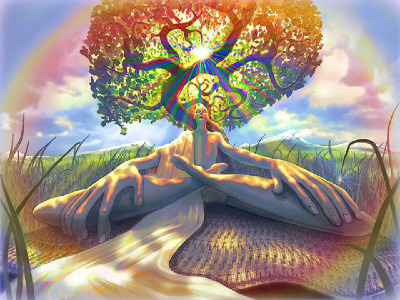Brahman
Brahman (bráhman-, nominative bráhma ब्रह्म) is a concept of Hinduism. Brahman is the unchanging, infinite, immanent, and transcendent reality which is the Divine Ground of all matter, energy, time, space, being, and everything beyond in this Universe. The nature of Brahman is described as transpersonal, personal and impersonal by different philosophical schools. In the Rig Veda, Brahman gives rise to the primordial being Hiranyagarbha that is equated with the creator God Brahmā. The trimurti can thus be considered a personification of hiranyagarbha as the active principle behind the phenomena of the universe. The seers who inspired the composition of the Upanisads asserted that the liberated soul (jivanmukta) has realized his identity with Brahman as his true self (see Atman (Hinduism)).
The word "Brahman" is derived from the verb brh (Sanskrit:to grow), and connotes greatness. The Mundaka Upanishad says:
- That supreme Brahman is infinite, and this conditioned Brahman is infinite. The infinite proceeds from infinite. Then through knowledge, realizing the infinitude of the infinite, it remains as infinite alone.
Note that "Brahman" is different from "Brahmin," the Priests/Holy Men. In fact Brahmin is derived from Brahman in the sense that a 'Brahmin is the one who knows Brahman'. The confusion between the terms can be dated back to the translation of the Upanishads into modern English.
The Supreme Cosmic Spirit or Absolute Reality called Brahman (not to be confused with the Creator god Brahmā) is said to be eternal, genderless, omnipotent, omniscient, omnipresent, and ultimately indescribable in human language. The sage-seers of the Upanishads had fully realised Brahman as the reality behind their own being and of everything else in this universe. They were thus Brahmins in the true sense of the word. These rishis described Brahman as infinite Being, infinite Consciousness and infinite Bliss (satcitananda). Brahman is regarded as the source and essence of the material universe. In its purest reality it is unmanifest (Nirguna Brahman) and thus beyond being and non-being. The Rig Veda records that in its initial manifestation (Saguna Brahman) as pure primordial Being Brahman is Hiranyagarbha (lit. golden womb), a fertile substrate (which Radhakrishnan calls the 'world-soul') out of which all worlds, organisms and even Gods and other divine beings (devas) arise:
- "Great indeed are the devas who have sprung out of Brahman." — Atharva Veda
Nirguna Brahman corresponds to the concept of 'Godhead' and Saguna Brahman to God as the Primordial Being.
It is said that Brahman cannot be known by material means, that we cannot be made conscious of it, because Brahman is our very consciousness. Brahman is also not restricted to the usual dimensional perspectives of being, and thus enlightenment, moksha, yoga, samadhi, nirvana, etc. do not merely mean to know Brahman, but to realise one's 'brahman-hood', to actually realise that one is and always was of Brahman nature (cf. the Mahayana concept of Buddha Nature). Indeed, closely related to the Self concept of Brahman is the idea that it is synonymous with jiva-atma, or individual souls, our atman (or soul) being readily identifiable with the greater soul (paramatma) of Brahman.
This site costs a lot of money in bandwidth and resources. We are glad to bring it to you free, but would you consider helping support our site by making a donation? Any amount would go a long way towards helping us continue to provide this useful service to the community.
Click on the Paypal button below to donate. Your support is most appreciated! |
|---|



